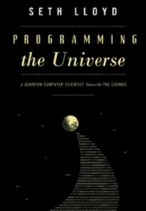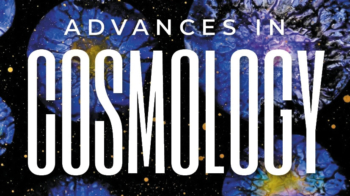by Seth Lloyd, Alfred A Knopf. Hardback ISBN 1400040922, $25.95.

I borrowed this book from my local library a couple of months ago and found it so irritating that I gave up after the first few chapters. When I agreed to review it I decided that I’d better read it a little more thoroughly – amazingly, this time I really enjoyed it.
Some of the anecdotes and name-dropping are rather annoying and I’m not sure that I can embrace the central thesis – that our universe is a giant quantum computer (QC) computing itself. (I would have thought that the inherent randomness of things argues against the universe as computer.) However, the book does contain an unusually informative and quirky account of the theory of our surroundings, from small to large, and it is very entertaining and easy to read.
As a sort of theoretical theory book, it is not real science that we are looking at here. It takes the current theories of particle physics and cosmology, assumes that they are all correct and then constructs a new all-embracing theory. Somewhere in the book a claim is made that there are predictions, but I didn’t see any sign of them (theories that make no predictions are unfortunately getting more and more common these days).
Perhaps the book is way ahead of its time. The most important force in the universe is surely gravity, so when some future theorist has finally developed a quantum theory of gravity, then we might be ready for it.
I have heard that the intelligent-design people are unhappy with this book, but they shouldn’t be. Lloyd has presented them with a great opportunity: surely the hypothetical intelligent designer and the hypothetical programmer of the big hypothetical QC within which we live might be one and the same.
As alert readers of CERN Courier will already know, a recently published experimental result (O Hosten et al. 2006 Nature 439 949) has confirmed theoretical speculation and demonstrated that QCs compute the same whether they are on or off. So here’s an interesting thought: amazing as our universe is, if Lloyd is right it might not even have been turned on yet.
Indeed, it all reminds me a bit too much of Deep Thought and a misspent youth, but it’s a fun book. I guess it takes a quantum-mechanical engineer to view things in such an odd manner. I do recommend this book, but urge that you don’t take it too seriously. Also make sure that you read it twice and remember that the answer might well be 42.





